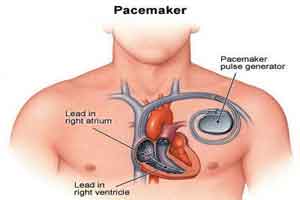- Home
- Editorial
- News
- Practice Guidelines
- Anesthesiology Guidelines
- Cancer Guidelines
- Cardiac Sciences Guidelines
- Critical Care Guidelines
- Dentistry Guidelines
- Dermatology Guidelines
- Diabetes and Endo Guidelines
- Diagnostics Guidelines
- ENT Guidelines
- Featured Practice Guidelines
- Gastroenterology Guidelines
- Geriatrics Guidelines
- Medicine Guidelines
- Nephrology Guidelines
- Neurosciences Guidelines
- Obs and Gynae Guidelines
- Ophthalmology Guidelines
- Orthopaedics Guidelines
- Paediatrics Guidelines
- Psychiatry Guidelines
- Pulmonology Guidelines
- Radiology Guidelines
- Surgery Guidelines
- Urology Guidelines
Pacemakers get a new energy source in Glucose

Researchers at the Instituto Tecnológico de la Energía(Technological Institute of Energy, ITE) are working on the creation of a bio-battery that uses blood glucose to produce energy. Such a battery would cut down on the number of surgical interventions a pacemaker user must undergo.
Current batteries are hardwearing and work well for implants that do not require much energy. However, when they run out, the patient must undergo surgery to replace them. Even devices that do not use much electricity, like pacemakers, have a limited useful life given this dependence on batteries.
The challenge of research in this area lies in developing electrodes made from materials that are compatibile with the human body, and able to oxidise blood glucose and convert it into fuel.
Mireia Buaki, project leader at the ITE, tells us more: "Glucose and oxygen are readily available in the human body, meaning our bio-battery could keep working indefinitely. Once the electrodes are fully developed, the next step will be to build a prototype bio-battery and test it to see whether it is able to obtain and store enough energy to power small implantable electronic devices, like pacemakers and cochlear implants."
The ITE has been working on the development of polymeric and carbonaceous materials for energy generation and storage systems, like this new battery, for many years. This technology is very versatile and could have many applications across a diverse range of fields, from the analysis and detection of substances in foodstuffs, to wastewater treatment.
This research is being developed under the State Programme for the Promotion of Talent and Employability of the Spanish Ministry of Economy and Competitiveness.
You can read the full article by clicking on the following link:
Asociación RUVID. "Glucose as a new energy source for pacemakers." ScienceDaily. ScienceDaily, 29 April 2016.

Disclaimer: This site is primarily intended for healthcare professionals. Any content/information on this website does not replace the advice of medical and/or health professionals and should not be construed as medical/diagnostic advice/endorsement or prescription. Use of this site is subject to our terms of use, privacy policy, advertisement policy. © 2020 Minerva Medical Treatment Pvt Ltd